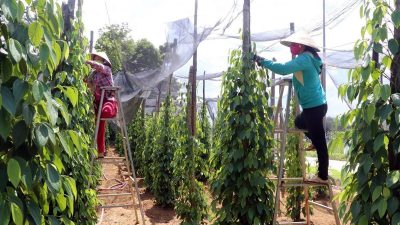
|
Chilica, which is the brand name of chili sauce and fermented ground chili products made by Nguyen Thanh Hien, intended to launch in 2020. |
|
However, two COVID-19 outbreaks at the beginning of the year and in July “broke” his plan to debut the products in Ho Chi Minh and Da Nang. However, Hien has cooperated with Tiki, Sendo and several other foreign e-commerce floors to promote and sell his products. Chilica was just one of many other small and medium enterprises looking to e-commerce floors to seek an outlet for their products. The biggest difference was that Chilcia was one of the few clean agricultural processing enterprises looking for distribution channels on e-commerce floors, among numerous consumer goods, cosmetics and others. The fact is that today, many high-quality agricultural products, which meet export standards and are affordable, are absent on large e-commerce floors such as Tiki, Sendo and Voso. What is the barrier and difficulty that makes Vietnamese agricultural products less popular on these sale channels in the 4.0 era? Experts recently had discussions attempting to find the reason and solutions as well as sharing experiences of successful cases at a conference to promote trade between Hanoi and other provinces and cities that was hosted by the Hanoi Promotion Agency (HPA). The speakers on the issue were Le Quoc Vinh, Chairman and CEO of LeGroup; Dang Hoang Hai, Director of Department of Trade and Economy under the Ministry of Industry and Trade; Nguyen Thai Dung, General Director of BRG Retail Limited Company; Nguyen Dac Viet Dung, Chairman of the Board of Directors of Sen Do Joint Stock Company; Dinh Thanh Son, Deputy General Director of Viettel Post Corporation; Vu Kim Hanh from the Business Association of High-Quality Vietnamese Products; Mac Quoc Anh Vice President cum General Secretary of Vietnam Association for Business Culture Development; and Pham Thi Ly, Director of Centre for Business Development and Integration. One of the biggest reasons for the low consumption of clean agricultural products via e-commerce floors is the products’ “life” cycle. Le Quoc Vinh shared: “I have accessed several e-commerce floors and saw that the quantity of goods and shops from these enterprises is very limited. Meanwhile, trading via Facebook is very active with the participation of mainly small-scale growers and buyers. This market was more active when the COVID-19 outbreak caused social distancing in Vietnam at the beginning of the year and in Da Nang in the middle of the year. This illustrated the difference between official e-commerce floors and social networks”. Vu Kim Hanh from the Business Association of High-Quality Vietnamese Products said that she has pursued the production of agricultural products for many years. She also noted that fresh agricultural products have not been popular on e-commerce floors because their “life” cycle is not long. There are not many standardised agricultural products, so it is difficult for owners of e-commerce floors to value and arrange the products. According to Nguyen Dac Viet Dung, Chairman of the Board of Directors of Sen Do Joint Stock Company, agricultural products are more difficult to buy on e-commerce floors than others. Normally, customers only buy cheap, easy-to-sell and structured goods (such as electronics and household appliances). “Consumers normally often buy agricultural products and food through familiar channels such as acquaintances and friends. However, the limitation of these channels is the size of the small community. Meanwhile, e-commerce floors have guarantees of quality and prestige”, he added. In addition, if the agricultural products’ life cycles can be extended, buyers will feel more secure. Nguyen Dac Viet Dung also noted that the e-commerce floors have around 35,000 shops, including 10,000 for agricultural products. This figure is large but not as much as other easy-to-sell and popular products, especially fashion goods. E-commerce floors also often have guarantees for buyers, such as tokens of guarantee and commitment. A good sign is that now both businesses and farmers are paying more attention to seeking out consumption channels on e-commerce floors. Pham Thi Ly, Director of Centre for Business Development and Integration. said the centre has about 1,000 small and medium-sized manufacturers who exchange their information and production plans together daily. For example, thanks to this connection, a small-scale shrimp-chip enterprise brought their products to many major large supply systems such as Vinmart and Bac Tom (Uncle Tom). Management agencies have also made moves towards promoting agricultural products via e-commerce floors. Dang Hoang Hai, Director of Department of Trade and Economy under the Ministry of Industry and Trade, said that the Ministry has launched a booth of Vietnamese products on Sendo and Voso to address several problems related to agricultural products. Another good sign is that in addition to the signing of cooperation agreements among provinces and localities at the conference, exchanges of memorandums of understanding and frameworks of cooperation agreements on supporting businesses to develop technology and enhance distribution development on e-commerce floors as well as the implementation of the booth of Vietnamese products via e-commerce floors such as Tiki, Sendo and Voso were promoted. Source: Nhan Dan Online |


